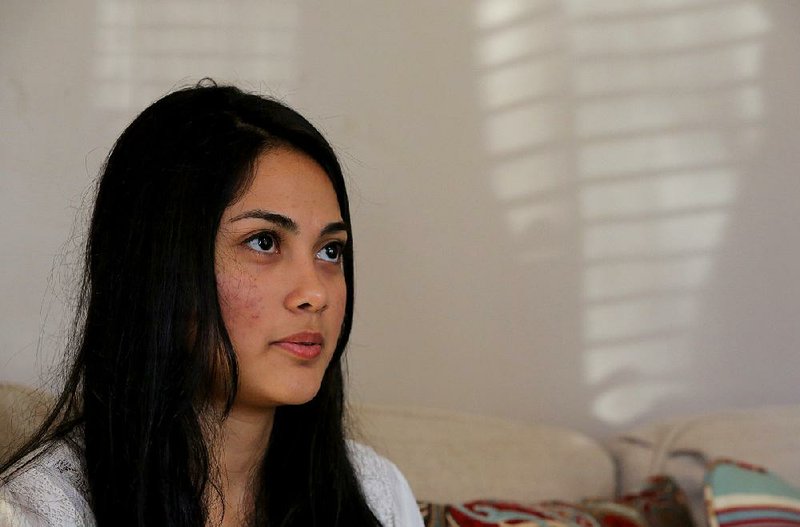SEARCY -- After three weeks of traveling with a group by bus and car, Tatiana Jaco-Alvarez crossed the Rio Grande on a small boat and started walking into the United States.
A helicopter flew overhead, and moments later she was in a patrol car.
Jaco-Alvarez, then 17, told immigration authorities that she came to the United States in 2016 to be reunited with her mother because her home country, El Salvador, was too dangerous. Weeks later, in a Memphis airport, she saw her mom for the first time in more than seven years.
Jaco-Alvarez said in an interview Tuesday with the Arkansas Democrat-Gazette that she was initially hesitant to make the trip to the U.S. but that fear of violence in her hometown and a longing to reunite with her mother gave her the courage.
[U.S. immigration: Data visualization of selected immigration statistics, U.S. border map]
"Most of all she really missed her mom," said Jaco-Alvarez's friend, Lucero Chena, who helped translate during the interview. "It had really been a long time."
Their reunion remains tenuous, as the family was reminded late last month when Jaco-Alvarez was arrested during what she expected to be a routine check-in with U.S. Immigration and Customs Enforcement. Jaco-Alvarez spent 10 nights in a Louisiana detention center before she was released on bond Monday afternoon.
"She said it was definitely an experience she'll never forget, and the fact that she met people there who had been [in jail] for months kind of scared her, because she thought to herself, 'I could be there for this long, too,'" Chena said.
Jaco-Alvarez and her sister were two of more than 59,000 unaccompanied children who arrived in the United States in fiscal 2016, two years after the number of unaccompanied migrant children arriving at the U.S. border -- predominantly from Central American countries -- began to surge.
Federal law affords unaccompanied migrant children from countries that don't share a border with the U.S. an opportunity to apply for lawful status before deportation. Although she has since turned 18, Jaco-Alvarez remains in that process.
Her arrest Jan. 27 in Little Rock has puzzled immigration attorneys because she did not miss a hearing for her pending removal case and has not been accused of committing a crime unrelated to immigration.
As agencies interpret executive actions taken by President Donald Trump, it's not clear whether Jaco-Alvarez's arrest was an isolated shift from law-enforcement norms or indicative of how agencies might take action more broadly against unaccompanied migrant children, attorneys said.
Jaco-Alvarez, who has an attorney, plans to file for asylum, she said. If she loses the claim and appeal, an immigration judge could order her deported back to El Salvador.
The Transactional Records Access Clearinghouse at Syracuse University, which tracks federal immigration data, reported that 48 percent of asylum claims filed by people with attorneys were denied in fiscal 2016. From fiscal 2011-16, 83 percent of asylum-seekers from El Salvador were denied, though 31 percent of those 11,500 claims were filed by people without legal representation.
A Searcy High School student who likes to play soccer and read fiction, Jaco-Alvarez said she wants to stay in her adopted city, go to college and become a nurse practitioner, a career that she was pursuing in El Salvador.
Jaco-Alvarez's mom moved to Searcy eight years ago, started a business and sent hundreds of dollars each month to Jaco-Alvarez's grandmother, who kept custody of the four children in Santa Ana. Four years ago, Jaco-Alvarez's grandmother received a phone call from someone threatening to kidnap the four children, her mother said. The family left Santa Ana but later returned.
Jaco-Alvarez graduated from high school in El Salvador and was attending college. A female student at the same school was murdered, scaring Jaco-Alvarez, she said. Jaco-Alvarez's mother has said two girls attending the university disappeared.
Around that time, during one of her daily telephone calls with her daughters, Jaco-Alvarez's mother raised the idea of them coming to the United States.
Jaco-Alvarez, who said she regularly saw gang members in her neighborhood, was initially reticent to come to the U.S. because she feared the border crossings, she said. A week after the phone call with her mom, she decided to make the trip.
The Democrat-Gazette is not identifying Jaco-Alvarez's mother by name because she is not a lawful U.S. resident.
Jaco-Alvarez and her younger sister were part of a group of about 20 that crossed the Rio Grande on May 15, 2016, she said. They rode in cars and buses, and slept on mattresses on the floors at unfamiliar homes. The journey took about three weeks even after a lengthy delay, she said.
Traveling from El Salvador to Guatemala was easy, she said, but the other two border crossings were challenging.
After waiting in a house for a week because of a heavy police presence, the group crossed from Guatemala into Mexico at the group leader's cue.
The group swelled as it got closer to the United States, Jaco-Alvarez said. The travelers crossed the river in a small boat and set off on foot before attracting authorities' attention.
"She was nervous because she didn't know exactly what was going to happen to her, but she said she was confident that God knew her plan," Chena said.
As of January, the fourth month of fiscal 2017, the U.S. Border Patrol had apprehended 21,314 unaccompanied migrant children at the southern border, a 23 percent increase from the same span in fiscal 2016, according to the agency's most recent data.
The vast majority of those children are referred to the U.S. Health and Human Services Department, which has the task of providing temporary shelter for them and arranging their release to sponsors, mostly relatives. The children live with sponsors while their immigration court cases are pending.
Jaco-Alvarez and her younger sister spent three weeks at a New York shelter before they were released to their mother.
Of the roughly 21,300 children apprehended this year, 85 percent were from El Salvador, Guatemala or Honduras, the so-called Northern Triangle of Central America, where gang participation and violence against women and children rank among the highest in the world.
U.S. Immigration and Customs Enforcement authorities arrested Jaco-Alvarez on Jan. 27 when she reported to a Little Rock enforcement office after receiving a letter summoning her for an interview with a deportation officer. Jaco-Alvarez was not accused of committing a nonimmigration crime and had not missed a court hearing.
Immigration attorneys, both involved and observing, said the arrest of an unaccompanied migrant child, even one who has turned 18, is rare in cases when the person has not otherwise broken the law and is complying with ongoing removal proceedings. A federal immigration judge in Louisiana ruled that Jaco-Alvarez could be released after posting a $1,500 bond, the lowest allowed by law.
The arrest was two days after Trump signed an executive order stating that it is federal policy to "detain individuals apprehended on suspicion of violating Federal or State law, including Federal immigration law, pending further proceedings regarding those violations."
The Los Angeles Times reported Saturday that Trump's immigration-policy experts provided a 20-page document to U.S. Department of Homeland Security officials in January that laid out how to ramp up immigration enforcement, including doubling the number of people in immigration detention to 80,000 per day.
The newspaper reported that as many as 8 million of the estimated 11 million people illegally living in the United States could be eligible for deportation under Trump's orders.
A public-affairs officer at Immigration and Customs Enforcement's New Orleans office said the agency will not take further action against Jaco-Alvarez until her pending court case is resolved. That spokesman, Thomas Byrd, also said the agency is waiting on the Department of Homeland Security to explain specific policy directives derived from Trump's order.
After her arrest, Jaco-Alvarez spent 10 nights in Immigration and Customs Enforcement's LaSalle Detention Facility in Jena, La.
"The bathroom, the stalls weren't covered, and the food was terrible," Jaco-Alvarez said through Chena.
She said she shared living space -- a large room with bunk beds -- with about 80 other female inmates, some close to her age but most of them older. She made friends with a few of the women, including a 21-year-old who was arrested at the same time as she was in Little Rock, she said.
Their stories frightened Jaco-Alvarez because many had been detained for months and did not know when they might be free.
"She said that she didn't like it there because they would describe how bad the place was and how they're missing out on their lives every day, memories of their lives taken away from them," Chena said.
Jaco-Alvarez did not witness violence in the lockup but didn't feel safe because several women locked up with her looked "iffy," she said through Chena.
Jaco-Alvarez's pastor and his wife picked up Jaco-Alvarez after 4 p.m. Monday. She asked that they stop at a gas station so she could buy a Coca-Cola, she said. Her first meal after leaving the Louisiana lockup was from the fast-food chain Popeyes Louisiana Chicken, because it was nearby, she said.
She arrived in Searcy about 11 p.m., showered, ate dinner, visited with her mom and went to bed about 1 a.m. She scuttled plans to return to school, which she now intends to do today.
Instead, she spent most of Tuesday asleep in her bed.
A Section on 02/08/2017
RELATED ARTICLES
http://www.arkansas…">Appeals judges told travel ban Trump's sphere http://www.arkansas…">Cotton bill would slash immigration, cap refugeeshttp://www.arkansas…">DeVos in as education chief http://www.arkansas…">In settlement, first lady to get blogger's apology http://www.arkansas…">Military leaders push budget lift http://www.arkansas…">Ayatollah: Trump is 'true face' of U.S.http://www.arkansas…">Measure to kill vote-assistance agency on movehttp://www.arkansas…">White House: Labor nominee forging on

